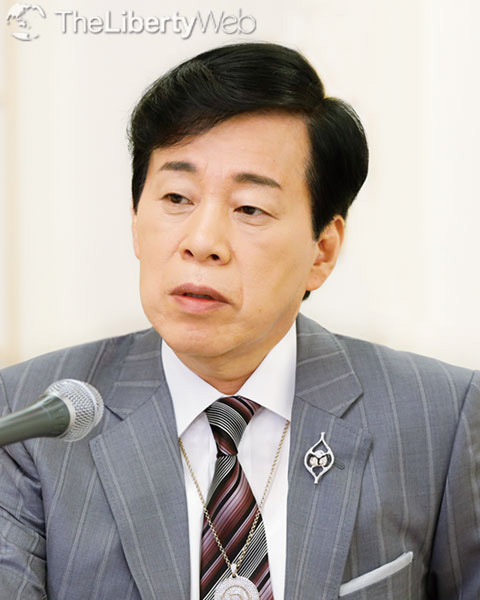How Can We Improve Healthcare Quality? The Key Is Better Management, Master Okawa Says
World Teacher’s Message No.309
Photo:PIXTA
I’m a doctor. Health care workers are drained and exhausted under current Japanese policies, and we have a shortage of doctors. Please share your thoughts on the ideal form of healthcare in Japan.
Lecture: “Living Your Day to the Fullest” (Q&A section)
November 30, 2008 – Happy Science Kobe East Temple

Master Ryuho Okawa: Many [Happy Science] members have been doctors from the start. In our early stage of Happy Science, whenever we held a gathering of doctors, around one thousand doctors would quickly come together. I don’t know why this is, but we have a relatively large membership of doctors.
The study of medical science itself is based on western medicine, so the study often stops at the materialistic level without reaching the world of the soul. A conflict of religion-versus-materialism is apt to occur in the medical sphere as well. In some cases, materialistic doctors are more capable than religious doctors, and some of those who claim to treat patients with faith can be “lazy doctors” so this is a bit of an issue.
Yes, it’s true that there’s an issue of having a “doctor shortage” due to our national system, but it’s the same case for lawyers. People fight back when you say, “Let’s increase the number of lawyers in this country to 3,000,” and in reality, lawyers themselves don’t make that much money. A lawyer who is just starting out may only earn two million yen a year (approximately $21,000 at the time of this lecture). He or she might say, “I’ve been studying for years and years and this is it?” or “I’d rather be employed and have an office job.”
In the same way, doctors don’t want to lower their income. They want to keep their guild, or the number of fellow doctors, from getting too big, and so all medical schools cap their students at about 100 people. They will list many reasons for this, like “The cost of operation will be too high,” or “We don’t have enough corpses,” but anyway, there is a cap on the number of medical students and if we increase that ceiling, we will have more doctors.
Actually, nowadays, the number of female doctors who go into dermatology, plastic surgery, or otolaryngology are increasing. It’s harder for female doctors who are highly capable to get married, so that’s the difficult part; it makes sense for women to choose these fields I just mentioned because they can go home earlier and it gives them a higher chance to get married and have a family.
Intern doctors are very busy as well. With frequent calls even in the middle of the night, or as they’re taking a bath, interns are required to live a harsh life. Many people can’t stand that.
Embedding a Service Mindset in Medical Education
Your point on national policy is very difficult. Recently (at the time of the lecture), Prime Minister Aso has been receiving harsh criticism for saying, “Doctors lack common sense,” but many people actually agree with him under the surface. Just look at hospital management. It’s worse than management of any business entity, right? As far as I can see, I don’t know if there’s any worse management, but if I were to choose one, public schools are comparable. University hospitals are especially bad, as they would easily make you wait for an hour; it would never happen in a private sector. Ultimately, they lack administrative or managerial knowledge. On the other hand, the people who can do administrative or managerial work don’t have sufficient medical knowledge. This often causes a clash.
[Medical workers] are not great at increasing productivity. There is always so much dissatisfaction on the patient side, but they’re not able to handle them. I think they’re very bad at using clerical workers and managing administrative work. This makes it hard to develop business leaders. It’s also just very difficult to turn doctors into managers. Some people can just do both, but in general, the two roles require different talent. In the case of doctors in private practice, it’s tough to survive without some level of management skills. But on the other hand, if an individual who is highly capable at business management joins a practice, they will be pushed away. Doctors don’t like being told what to do and have their pride damaged.
Generally speaking, medical education should teach a service mindset or societal common sense or the system of work in some shape or form. I think so. It doesn’t have to be “management theory” that we see in our general society. It would create additional things they would have to study in school and students may not like that. They must be busy preparing for the national exam to become certified as a doctor. But what Mr. Aso said was his honest opinion. It’s true that the general society is thinking, “Health care workers aren’t capable. They must be smart but why can’t they be efficient?” You need to raise productivity to another level.
Everything in Moderation: Healthcare Should Consider When to Stop
The next point is that insurance premiums are very high, just like pensions. Pensions and health insurance are “taxes” in disguise. Our government makes it seem like we have low tax rates, when in reality, they are collecting a lot of “taxes” by other means. Bureaucrats may be clever in making it seem like they’re not taxes, but that’s what they really are. Now, I don’t know if they are making a productive use of this money. Just like the government budget is being used to dig up roads at the end of every fiscal year, perhaps they’re spending the budget like that. So we are deeply troubled.
Overall, I suppose doctors are capable by the increase in average life expectancy. The average lifespan has been increasing steadily in the post-war era. Doctors are working hard to increase the lifespan by 10 or 20 years, but at the same time, they have created an aging society. People who used to pass away within five years of retirement are now living longer by 20 or 30 years, so this is beginning to eat up taxpayers’ money. There is a possibility of national bankruptcy.
It’s a difficult ask, but what we need are “doctors with noble character” as well as “capable and productive doctors”. Also, the field has become overly specialized, so we also need doctors with broad perspectives. We might want a Dr. Koto, but if we were to actually do that, we would become a “murderer.” (Translator’s note: Dr. Coto is a character from a Japanese drama-turned manga series, “Dr. Koto’s Clinic.”) One doctor can’t do everything in real life, which makes this a difficult issue.
At the end of the day, it might be good to give up in moderation. If doctors work too hard, it may worsen Japan’s aging society. We must do our best to keep alive those who can still work, but many of our doctors are fighting to extend the lives of those who are clearly ready to move on, and some of them are overdoing it. I think so. There are doctors who are extending the life of their patients even though the patients have already reached the normal life expectancy, and I think there are both good and bad aspects to this.
It’s not always a good thing to extend the life of a patient. It’s fine if the patient can return to society once they are cured, but if these patients will be undergoing long-term medical treatment and surviving on medicine in a hospital bed, the shortage of doctors will never be solved.

Photo:PIXTA
Doctors Need to Take On a ‘Life Consultant’ Role
This is really hard for me to say, but prolonged suffering in old age is also a problem. So, ideally, it’d be nice to have a hospital adjacent to a religious facility. This will allow patients to hold less attachments, and they might say, “I’m fine either way. If you can cure me, so be it; if I can’t be cured, I’m ready to move on.” That wouldn’t be a bad idea.
Humans must acquire a religious view once you grow old. I believe so. This is a difficult point. It’s not always the best to live the longest materialistic life possible – make effort to live a spiritually abundant life in your later years.
As a doctor, you may be too busy when you are young. But as you grow old and become more prominent in your field, you may need to brush up your perspective on life and teach patients the way of life. If you felt that time has come for your patient to part ways with this world, you might tell your patient, “Hey there. It might be time to organize your surroundings so your children won’t be inconvenienced.” Just like that, you also need to take on the role of a life consultant.
My response to your question might not be sufficient, but based on the overall consciousness of the public, I get the feeling that dissatisfaction is pretty high. I do get a sense that there are too many unnecessary medications and medical treatments, so perhaps it is not simply a matter of fiscal shortfall.
Monitoring Hospital Productivity: Disclose Doctors’ Records
Another point I’d like to make is that a doctor’s qualification is too protected, similarly to teachers. I propose a clear-cut disclosure of each doctor’s records and achievements. Even in professional baseball, we can see the players’ batting averages and pitching statistics. Likewise, we should be able to see more clearly, “This percentage of patients have died under this doctor,” and such. Doctors may not like that, but if these records became more transparent, we’ll have “profitable doctors” and “not-so-profitable doctors.”
Everyone has certain professions they aren’t suited for. It’s important to attract people who are suited for the job, whereas those who aren’t can change their career as they see fit. In some cases, those who aren’t suited to be doctors are teaching as college professors so it’s a little scary. It’s terrifying to imagine that a professor may be shaking his or her hands as they are performing surgery.
So, it might be painful, but I feel that the healthcare industry needs to disclose more data and become customer oriented. I understand that there are many concerns among doctors. But know that you are respected, and that your profession is protected even if you make many mistakes; in some sense, you have allowances that would be unthinkable in other professions, so you may have to endure this paradox.
Lawyers, for instance, say things like, “You must not advertise your practice.” There is a habit of hiding things all around. In that aspect, clear advertisement and information disclosure may be necessary so patients can determine if doctors or lawyers can be trusted.
There is a pretty significant waste of taxpayers’ money, so I don’t think the public will be convinced unless medical practices increase their productivity. “More doctors” and “higher medical costs” without any justification won’t cut it. So, I feel that hospital productivity will be monitored.
The Need to Create Jobs in Japan’s Aging Society
What’s left might be to say, “Go to temple.” It can’t be helped to a certain extent. One role of a doctor may be to tell your patient, “All things are impermanent,” “There is an afterlife,” “It’s time to accept it.”
I think this might be too big of an issue for you alone to face. After all, for the longest time, it’s been a dream for medical care to advance and extend our lifespan. We’re accomplishing something that not even Qin Shi Huang, the first emperor of China, couldn’t achieve. In some sense it is a utopian society, but we need to ask ourselves, “How can the elderly live happily?” It’s fine if they are cured from sickness and become healthy once again. The next step is to create jobs for the elderly. We need to create a labor market for them as it would be too much of a burden for the declining, young population of Japan. We need to create work that the elderly can do. I think there’s a way to do more with healthcare if those things are taken into consideration – but not if everyone goes on the hospital bed.
Especially as it relates to healthcare, as I said before, the Prime Minister is not entirely wrong. The hospital might be an isolated bubble where medical practitioners are calling each other “Doctor,” but many doctors seem out of touch with society so they should make an effort to study different genres and become cultured.

Photo:PIXTA
It Can’t Be Helped: Certain Hospitals Will Become Obsolete
There are hospitals out there that are losing money, but it can’t be helped that some hospitals will become obsolete. It could be that the doctors there have poor skills or there is overall poor service, but either way, some hospitals will be eliminated. Perhaps it’s naïve to think, “My future is bright as long as I get into medical school.” After all, in any profession, it is the case that your performance is dependent on the efforts you make after graduating from school.
The other point is management. As I’ve already said, this industry doesn’t know how to use people. Your boss or your supervisors aren’t efficient so it’s not that easy for those underneath to become better at their job. It’s a matter of poor time efficiency. Before, some school teachers were sent to hotels and other places as a so-called seminar; likewise, I do wish doctors knew more about the outside world.
If I were to make a suggestion, volunteering on your day off might allow you to learn the ways of work, and you may discover improvement points for your day-to-day job. Happy Science may be such a place where you can gain new insight.
I am indeed thankful that, for a religion, [Happy Science] has a lot of members who are doctors. I wonder why this is? I’m not so sure, but perhaps this is because Happy Science has the word “science” in its name. Or, we have many intellectual members in general so maybe that’s why it’s easier for doctors to join our religion. We’ve always had a relatively large group of members who were new to religion, and I often speak logical things, so maybe that’s the reason it’s easy to join.
I, too, am a religious teacher but I still speak out against the doctrine of the virgin birth. I can’t help but say, “The virgin birth? How could you preach that? Nowadays, many brides are six-months pregnant. This is it, no?” In that sense, I may be aligned with the medical truth. I am of the opinion that [Happy Science doesn’t] need to be respected in those things [like preaching the virgin birth]. Simply put, we need to be respected of our teachings. I don’t plan on advocating hard for the virgin birth and preaching, “Believe in its miracle!” We, as a religion, have rationality. We don’t accept things that make no sense.
Healthcare Reform Requires Managerial Eyes
Alas, we need help with these issues. We need more leaders in the medical field to step forward and provide support, as we are still short of power to make proposals and reform the medical field. I would think that you have opportunities to present ideas, so please come up with findings and make recommendations as a doctor yourself. People within the industry must offer suggestions in order for these issues to become apparent. I’m sure you have opportunities. It’s crucial for people of that particular profession to voice their opinions. Was Prime Minister Aso stating the facts in saying that “doctors have no common sense”? You need to do more research on what the general public is really thinking, so both sides need to make an effort.
But, please recognize that a portion of medical costs come from taxpayers’ money. People cannot simply accept, “There is a shortage of doctors,” at face value. In any field, there are businesses that become obsolete and get eliminated. You must remove wasteful spending, so I believe a managerial eye is required.
After all, even large companies go under. As for the banking industry, I remember when there were 20 city banks in Japan. I used to tell people this will be narrowed down to four or five, and just like that, we now have four or five large banks. There was an excess of banks so I said these would probably go bankrupt. No one thought those large banks would go under, but they did. You can have macro perspectives like this.
This will happen among the medical association. I’m sure it will. Something will happen. You might think you’re doing outstanding work yourselves, but what you’re doing may be Japan’s pus that needs to be squeezed out. Some things may be corrupt, and they need to be reviewed.



















